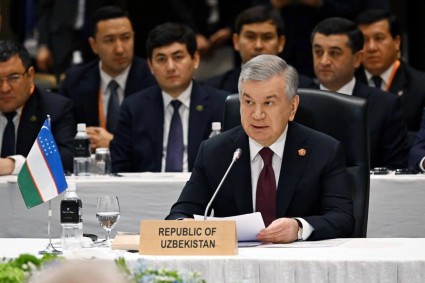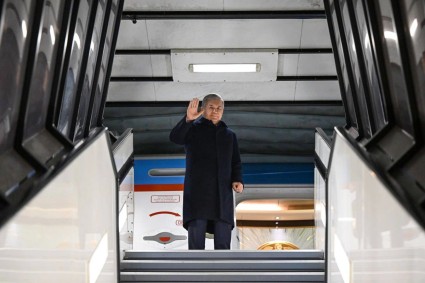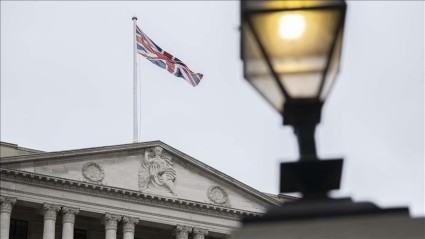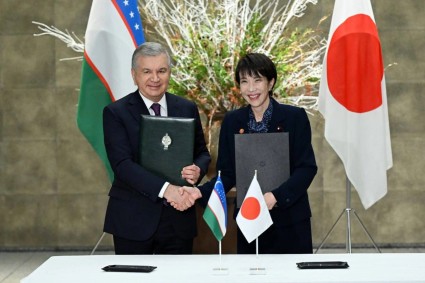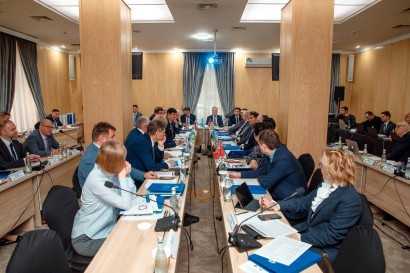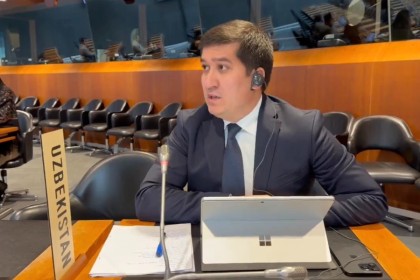European Union Sanctions Envoy David O'Sullivan arrived in Uzbekistan for a two-day visit. After meeting with the President Shavkat Mirziyoyev, he held a press conference at which he spoke about the task of his mission.
At the beginning of the event, the special envoy recalled that the sanctions developed by the G7 countries and the United States against Russia have only one goal - to undermine its ability to wage an aggressive war against Ukraine.
“I want to emphasize: we do not intend to impose sanctions on third countries, on Uzbekistan in particular, we also have no desire to interfere with the development of Uzbekistan and its trade relations with other countries, including Russia,” said David O’Sullivan.
The European Union is concerned about the possibility of circumventing the sanctions imposed on Russia through third states. “Recently, we have observed unusual trade transactions and the fact that products manufactured in the EU countries and under sanctions somehow enter the territory of Russia through the territory of third countries,” the special envoy said.
He stressed that an increase in the import of sanctioned goods from the EU countries is observed in a number of states. “Therefore, I was on visits to the United Arab Emirates, Turkey, Kazakhstan, before I came to Uzbekistan. I also intend to visit Georgia, Armenia and Serbia. I emphasize once again that Uzbekistan is only one of the states to which we are heading with our mission, ”said the EU Special Envoy.
According to David O'Sullivan, in recent months the EU has had a fruitful exchange of information, in particular with the Customs Committee and the Central Bank of Uzbekistan on financial issues. “We were able to resolve some issues in this dialogue in a working order,” he said.
“We respect Uzbekistan's desire to remain neutral [on the issue of Russia's war against Ukraine] and, nevertheless, with great enthusiasm and gratitude, we received assurances that Uzbekistan is against its territory being used to circumvent the imposed sanctions. We understand that this is the political choice of the state,” said David O’Sullivan.
He noted that in the course of working contacts, the EU handed over to the Uzbek side a list of goods produced in the EU countries that have a dual or military use and "contribute to the ability of the Russian military machine to conduct a murderous war against the people of Ukraine."
According to him, we are talking about high-tech block diagrams, microchips, optical equipment that can be used for weapons, guidance systems, artillery and cruise missiles. “These are the products that we find in captured military equipment seized from the Russian military. We know that they use a number of products and parts for weapons to kill Ukrainians. And that is why we asked that special attention be paid to the movement of these products across borders,” the EU special envoy explained. He added that we are not talking about similar products produced in Uzbekistan.
“We asked our Uzbek colleagues to pay special attention to the possible transportation of a list of products [produced in the EU] through Uzbekistan, since recently we have seen an increase in exports of goods from this list through the territory of Uzbekistan by 126%, which is quite significant,” said David O’Sullivan .
He added that the EU, realizing the concerns that sanctions can cause for businesses, is holding a two-day workshop for government organizations and the private sector to explain the nature of these sanctions, “so that people know what to worry about and what not to worry about.” .
“We hope to continue this dialogue in the future, because we think that, unfortunately, these sanctions will last for a long time, for many years. Even assuming that the hostilities on the territory of Ukraine will end in the next month (which we have no evidence), there will be a number of issues that will need to be addressed. In particular, this is an investigation of war crimes, issues of reparations, issues of rebuilding the destroyed infrastructure of Ukraine. In other words, we will have to learn to live under these sanctions. Therefore, we would not like this issue to stand in the way of bilateral relations between Uzbekistan and the European Union, which we look at with great inspiration and hope,” David O’Sullivan emphasized.
Answering a question about the potential for Uzbek business to fall under the sanctions imposed against Russia, the special envoy explained that in this case it can only be an illegal circumvention of sanctions that impose a ban on the re-export of European products from the aforementioned list to Russia.
“If there are any illegal transactions, if, say, we see that some Uzbek economic entities are involved in this, of course, they will fall under the sanctions. But, I repeat, our goal is not to impose sanctions on the economy of Uzbekistan. We are talking only about illegal transactions that help circumvent the imposed sanctions. And trade and economic relations between Uzbekistan and Russia is an internal affair of these two states,” said the EU special envoy.
He again elaborated on situations that could provoke an EU reaction: “If the products on the sanctions list are produced in Uzbekistan and delivered to Russia, there is no problem with that. If they are exported from third countries (outside the EU - ed.) and again re-exported to Russia, there are no problems with this either. The problem arises when sanctioned products from this list, produced by the European Union, are imported from the territory of the EU and enter Russia through the territory of Uzbekistan. This is an illegal circumvention of the imposed sanctions.”
David O'Sullivan said that he was "very impressed with the monitoring system that exists in Uzbekistan in the field of controlling financial flows and trade." “I am confident that the Uzbek authorities will find a way to effectively monitor the possible re-export of these products from the sanctions list,” he added.
The special envoy noted that the EU asks the authorities of Uzbekistan only to strengthen control over such products, and in what ways the country does this is its internal business, the EU only explains that control measures should be introduced as soon as possible, since we are talking about military operations that take lives.
“We hear understanding, and discuss ways to best implement this. We hope that as a result of our mission, very soon we will see a decrease in these figures, statistics on the re-export of goods from the above list,” the EU Special Envoy concluded.






